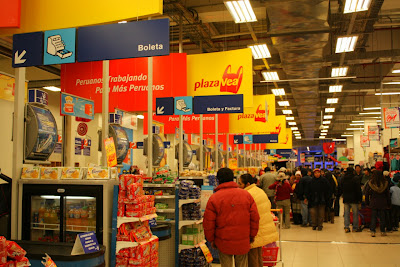What happens when a giant megastore opens up in a town that has always been supported by small, local shops and street vendors?
It's a question we've discussed quite a bit throughout our trip as a Plaza Vea opened up in Puno within the past year. Our knee-jerk reaction was that, much like Walmart and similar retailers have made it more difficult for a local businesses in a small town in the United States to survive, massive commercial supercenters scattered across Peru would have largely the same effect.
However, the flip side is that in an area where many resources of a highly developed society are lacking, it's a stride forward toward a more advanced standard of living in line with what we're accustomed to in the United States.
From a day-to-day perspective, we were apprehensive to go to Plaza Vea in attempt to support the local economy and the common workers of the city. But eventually we caved and were amazed at both the variety of merchandise and quality that it was made with. Despite our participation in Puno's new-found consumerism, we were a little put-off by the crowds of people roaming the store (it literally felt like the entire town fled into the fluorescently lit aisle some evenings) and found it surprising how easily people made the transition away from a traditional street market.
One of the most disturbing parts about Plaza Vea is their false claims that "Todo cuesta menos" (translation: Everything costs less) when most of the items in the store are more expensive in comparison to other retailers and vendors in town. Moreover, this slogan is plastered on large, colorful billboards around Puno contrasting the blandly colored brown cityscape. This instance of false advertising on such a grand scale is compounded even further when considering the Peruvian are not nearly as savvy in response to ads as we are in the United States.
Although Puno's Plaza Vea provides some temporary improvements for the inhabitants of the city in the form of otherwise unavailable or rare commodities, the long-term consequences of such an establishment could bring an end to neighborhood shops and street vendors. In other words, the presence of one big-box store in a city of about 100,000 people could change more of the composition of the city than just a few shinny billboards.
[Written by David Riva | Photos by Clare Toeniskoetter]
One of the most disturbing parts about Plaza Vea is their false claims that "Todo cuesta menos" (translation: Everything costs less) when most of the items in the store are more expensive in comparison to other retailers and vendors in town. Moreover, this slogan is plastered on large, colorful billboards around Puno contrasting the blandly colored brown cityscape. This instance of false advertising on such a grand scale is compounded even further when considering the Peruvian are not nearly as savvy in response to ads as we are in the United States.
Although Puno's Plaza Vea provides some temporary improvements for the inhabitants of the city in the form of otherwise unavailable or rare commodities, the long-term consequences of such an establishment could bring an end to neighborhood shops and street vendors. In other words, the presence of one big-box store in a city of about 100,000 people could change more of the composition of the city than just a few shinny billboards.
[Written by David Riva | Photos by Clare Toeniskoetter]















0 comments :
Post a Comment